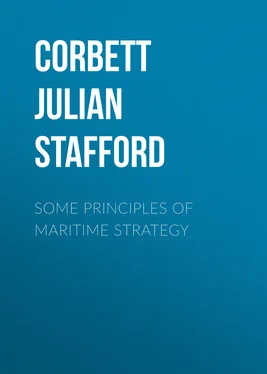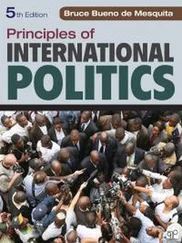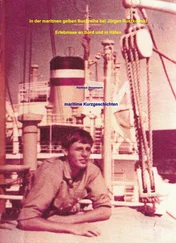Julian Corbett - Some Principles of Maritime Strategy
Здесь есть возможность читать онлайн «Julian Corbett - Some Principles of Maritime Strategy» — ознакомительный отрывок электронной книги совершенно бесплатно, а после прочтения отрывка купить полную версию. В некоторых случаях можно слушать аудио, скачать через торрент в формате fb2 и присутствует краткое содержание. Жанр: military_special, Прочая научная литература, История, foreign_edu, на английском языке. Описание произведения, (предисловие) а так же отзывы посетителей доступны на портале библиотеки ЛибКат.
- Название:Some Principles of Maritime Strategy
- Автор:
- Жанр:
- Год:неизвестен
- ISBN:нет данных
- Рейтинг книги:5 / 5. Голосов: 1
-
Избранное:Добавить в избранное
- Отзывы:
-
Ваша оценка:
- 100
- 1
- 2
- 3
- 4
- 5
Some Principles of Maritime Strategy: краткое содержание, описание и аннотация
Предлагаем к чтению аннотацию, описание, краткое содержание или предисловие (зависит от того, что написал сам автор книги «Some Principles of Maritime Strategy»). Если вы не нашли необходимую информацию о книге — напишите в комментариях, мы постараемся отыскать её.
Some Principles of Maritime Strategy — читать онлайн ознакомительный отрывок
Ниже представлен текст книги, разбитый по страницам. Система сохранения места последней прочитанной страницы, позволяет с удобством читать онлайн бесплатно книгу «Some Principles of Maritime Strategy», без необходимости каждый раз заново искать на чём Вы остановились. Поставьте закладку, и сможете в любой момент перейти на страницу, на которой закончили чтение.
Интервал:
Закладка:
Julian Stafford Corbett
Some Principles of Maritime Strategy
INTRODUCTION
The Theoretical Study of War—Its Use and Limitations
At first sight nothing can appear more unpractical, less promising of useful result, than to approach the study of war with a theory. There seems indeed to be something essentially antagonistic between the habit of mind that seeks theoretical guidance and that which makes for the successful conduct of war. The conduct of war is so much a question of personality, of character, of common-sense, of rapid decision upon complex and ever-shifting factors, and those factors themselves are so varied, so intangible, so dependent upon unstable moral and physical conditions, that it seems incapable of being reduced to anything like true scientific analysis. At the bare idea of a theory or "science" of war the mind recurs uneasily to well-known cases where highly "scientific" officers failed as leaders. Yet, on the other hand, no one will deny that since the great theorists of the early nineteenth century attempted to produce a reasoned theory of war, its planning and conduct have acquired a method, a precision, and a certainty of grasp which were unknown before. Still less will any one deny the value which the shrewdest and most successful leaders in war have placed upon the work of the classical strategical writers.
The truth is that the mistrust of theory arises from a misconception of what it is that theory claims to do. It does not pretend to give the power of conduct in the field; it claims no more than to increase the effective power of conduct. Its main practical value is that it can assist a capable man to acquire a broad outlook whereby he may be the surer his plan shall cover all the ground, and whereby he may with greater rapidity and certainty seize all the factors of a sudden situation. The greatest of the theorists himself puts the matter quite frankly. Of theoretical study he says, "It should educate the mind of the man who is to lead in war, or rather guide him to self-education, but it should not accompany him on the field of battle."
Its practical utility, however, is not by any means confined to its effects upon the powers of a leader. It is not enough that a leader should have the ability to decide rightly; his subordinates must seize at once the full meaning of his decision and be able to express it with certainty in well-adjusted action. For this every man concerned must have been trained to think in the same plane; the chief's order must awake in every brain the same process of thought; his words must have the same meaning for all. If a theory of tactics had existed in 1780, and if Captain Carkett had had a sound training in such a theory, he could not possibly have misunderstood Rodney's signal. As it was, the real intention of the signal was obscure, and Rodney's neglect to explain the tactical device it indicated robbed his country of a victory at an hour of the direst need. There had been no previous theoretical training to supply the omission, and Rodney's fine conception was unintelligible to anybody but himself.
Nor is it only for the sake of mental solidarity between a chief and his subordinates that theory is indispensable. It is of still higher value for producing a similar solidarity between him and his superiors at the Council table at home. How often have officers dumbly acquiesced in ill-advised operations simply for lack of the mental power and verbal apparatus to convince an impatient Minister where the errors of his plan lay? How often, moreover, have statesmen and officers, even in the most harmonious conference, been unable to decide on a coherent plan of war from inability to analyse scientifically the situation they had to face, and to recognise the general character of the struggle in which they were about to engage. That the true nature of a war should be realised by contemporaries as clearly as it comes to be seen afterwards in the fuller light of history is seldom to be expected. At close range accidental factors will force themselves into undue prominence and tend to obscure the true horizon. Such error can scarcely ever be eliminated, but by theoretical study we can reduce it, nor by any other means can we hope to approach the clearness of vision with which posterity will read our mistakes. Theory is, in fact, a question of education and deliberation, and not of execution at all. That depends on the combination of intangible human qualities which we call executive ability.
This, then, is all the great authorities ever claimed for theory, but to this claim the chief of them at least, after years of active service on the Staff, attached the highest importance. "In actual operations," he wrote in one of his latest memoranda, "men are guided solely by their judgment, and it will hit the mark more or less accurately according as they possess more or less genius. This is the way all great generals have acted.... Thus it will always be in action, and so far judgment will suffice. But when it is a question not of taking action yourself, but of convincing others at the Council table, then everything depends on clear conceptions and the exposition of the inherent relations of things. So little progress has been made in this respect that most deliberations are merely verbal contentions which rest on no firm foundation, and end either in every one retaining his own opinion, or in a compromise from considerations of mutual respect—a middle course of no actual value." 1 1 Clausewitz, On War , p. ix. The references are to Colonel Graham's translation of the third German edition, but his wording is not always followed exactly.
The writer's experience of such discussions was rich and at first hand. Clear conceptions of the ideas and factors involved in a war problem, and a definite exposition of the relations between them, were in his eyes the remedy for loose and purposeless discussion; and such conceptions and expositions are all we mean by the theory or the science of war. It is a process by which we co-ordinate our ideas, define the meaning of the words we use, grasp the difference between essential and unessential factors, and fix and expose the fundamental data on which every one is agreed. In this way we prepare the apparatus of practical discussion; we secure the means of arranging the factors in manageable shape, and of deducing from them with precision and rapidity a practical course of action. Without such an apparatus no two men can even think on the same line; much less can they ever hope to detach the real point of difference that divides them and isolate it for quiet solution.
In our own case this view of the value of strategical theory has a special significance, and one far wider than its continental enunciators contemplated. For a world-wide maritime Empire the successful conduct of war will often turn not only on the decisions of the Council chamber at home, but on the outcome of conferences in all parts of the world between squadronal commanders and the local authorities, both civil and military, and even between commanders-in-chief of adjacent stations. In time of war or of preparation for war, in which the Empire is concerned, arrangements must always be based to an exceptional degree on the mutual relation of naval, military, and political considerations. The line of mean efficiency, though indicated from home, must be worked out locally, and worked out on factors of which no one service is master. Conference is always necessary, and for conference to succeed there must be a common vehicle of expression and a common plane of thought. It is for this essential preparation that theoretical study alone can provide; and herein lies its practical value for all who aspire to the higher responsibilities of the Imperial service.
Читать дальшеИнтервал:
Закладка:
Похожие книги на «Some Principles of Maritime Strategy»
Представляем Вашему вниманию похожие книги на «Some Principles of Maritime Strategy» списком для выбора. Мы отобрали схожую по названию и смыслу литературу в надежде предоставить читателям больше вариантов отыскать новые, интересные, ещё непрочитанные произведения.
Обсуждение, отзывы о книге «Some Principles of Maritime Strategy» и просто собственные мнения читателей. Оставьте ваши комментарии, напишите, что Вы думаете о произведении, его смысле или главных героях. Укажите что конкретно понравилось, а что нет, и почему Вы так считаете.












